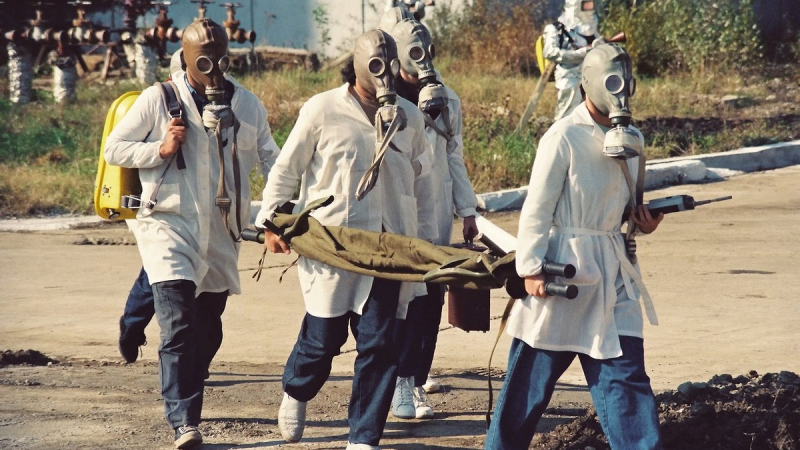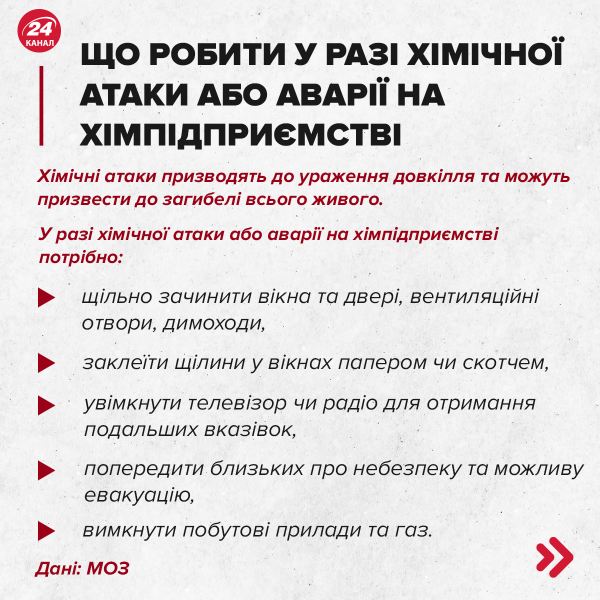
How to proceed with a chemical weapon attack: the main rules/Pixabay
Usage chemical weapons are prohibited, but the occupiers do not disdain war crimes. The Russians used chemical weapons in Syria, and on April 11 they used them for the first time in Ukraine.
If you find yourself in a chemical weapons area, trust information only from trusted or official sources and follow the instructions.
The most common symptoms
Then that the enemy used chemical weapons on you can be understood by the symptoms:
- excessive constriction of the pupils,
- disorientation and sweating,
- twitching and convulsions,< /li>
- respiratory irritation and difficulty breathing
- eye and skin irritation
- nausea and vomiting
- loss of consciousness.
Important: There are several types of chemical weapons, so the symptoms and reasons for first aid may vary. Now we publish the main rules of conduct. And here you will find more detailed instructions on how to act as a result of damage to various chemicals.
First aid for damage to various chemicals: Source of the Ministry of Health, Channel 24 Infographics< /p>






What to do if you are in the affected area
If you are on the street
First of all, leave the affected area. Try to leave quickly, but do not run. Breathe slowly to inhale as little poison as possible. Find a safe hiding place nearby.
If you are in a car, pull over to the side of the road so you don't interfere with traffic. Then turn off the engine and close all vents that draw in outside air, in particular the air conditioner vents. Cover your mouth and nose with a cloth or face mask.
If you are indoors
- Go to the highest floor and find a room with the fewest windows and doors.
- Close windows, doors, vents, and anything else that helps bring air in from outside.
- Do not eat or drink anything that may have been exposed to chemicals.
- Turn on the news and wait until it is safe to go outside.
Chemical Attack Checklist/Channel 24 Infographic/Source MoH

Reminder of actions in case of a chemical attack/Channel 24 infographic/Source of the Ministry of Health
First actions for symptoms
h3>
- If you feel symptoms, take off your top layer of clothing. If possible, put it in a bag and close it. Place this bag in another bag and seal with duct tape.
- If you have symptoms of eye and skin damage (burning, itching), then rinse them with water. But we emphasize that the water must be clean. Do not use contaminated water.
- Do not wash your eyes with soap and do not touch other people to avoid possible spread of the chemical.
General rules for evacuation
- If you feel symptoms, take off your top layer of clothing. If possible, put it in a bag and close it. Place this bag in another bag and seal with duct tape.
- If you have symptoms of eye and skin damage (burning, itching), then rinse them with water. But we emphasize that the water must be clean. Do not use contaminated water.
- Do not wash your eyes with soap and do not touch other people to avoid possible spread of the chemical.
General rules for evacuation
During evacuation from the affected area, wear clean, tight clothing that covers all parts of the body as much as possible. If possible, wear goggles, gloves, masks, a hat and a raincoat. The more closed your skin, the better.
If you are in hiding, stock up on water, food, and essentials.
Do not return to the affected area without the appropriate orders from the State Emergency Service and others emergency services, because territories can be dangerous for a long time (even several months).

Reminder of actions in the event of a chemical attack/Channel 24 infographic/Source MoH

